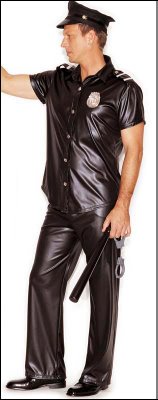 HOLLYWOOD, CALIFORNIA - On the red carpet at the GLAAD Media Awards at Hollywood's Kodak Theater last Saturday night, Los Angeles Police Chief William Bratton drew little attention compared to the flashbulb frenzy that would greet honorees Charlize Theron, the cast of "Will & Grace" and presenter Jessica Alba.
HOLLYWOOD, CALIFORNIA - On the red carpet at the GLAAD Media Awards at Hollywood's Kodak Theater last Saturday night, Los Angeles Police Chief William Bratton drew little attention compared to the flashbulb frenzy that would greet honorees Charlize Theron, the cast of "Will & Grace" and presenter Jessica Alba.I assumed Bratton was there for the photo op, looking to appear gay-friendly at the Gay & Lesbian Alliance Against Defamation's high-profile event honoring mainstream media projects and individuals.
But I couldn't resist engaging the city's top cop and asking, "What are you doing here?"
"The GLAAD party, whether in L.A. or New York, is always a hoot," Bratton said, holding the hand of his wife, Court TV correspondent Rikki Klieman.
"But I have an ulterior motive. I'm hopefully going to be doing a little recruiting. We are in the midst of a hiring binge in the LAPD and this is one of the communities that we are actively recruiting."
As an entertainment reporter, I didn't know all that much about Bratton's policies, but I did know that he is a media-savvy man. So was he merely paying lip service to the notion of a force with more gays and lesbians on it?
The longer we talked, the more Bratton sounded like a man who meant what he was saying about inclusion, not because it was politically correct, but because it is what he believes.
"The LAPD, like my former departments Boston and New York, have for years actively sought to get gay and lesbian candidates, and we have quite a few in the department," he said.
"I have no doubt that our percentage of gays, while it might be in the single digits, is something we'll see in the next couple of years go into the double digits."
Bratton went on to say that, ideally, he wants the gay and lesbian makeup of the LAPD to be in direct proportion to the city's gay and lesbian population. Just as the 40 percent Latino and 15 percent black officers are reflective of the population.
Kleiman offered her testimony to her husband's commitment: "He's actually always been progressive on this issue and has really been a champion of gay rights in Boston, New York and certainly now."
This is a far cry from that environment in 1993, when the Los Angeles City Council agreed to settle a 1988 discrimination lawsuit by former Officer Mitchell Grobeson and two other plaintiffs who claimed they suffered rampant harassment and discrimination including anti-gay slurs from other officers.
As part of the settlement, the LAPD enacted new policies aimed at ending discrimination against gays and lesbians.
Grobeson returned to the force but ended up filing a discrimination lawsuit two years later claiming he was disciplined for not asking to wear his uniform at a gay pride parade and for appearing in an magazine ad recruiting gays and lesbians to the LAPD.
Grobeson has since retired and never served in the Bratton-led force that is sponsoring a job fair this summer at the Los Angeles Gay and Lesbian Center.
Bratton and his wife also plan to march in the gay pride parade in West Hollywood in May, and he said, "we will have quite a few gay officers with us."
Members of the LAPD's recruitment unit will also travel to Chicago this summer where the department is an official sponsor of the Gay Games, an Olympic-style sporting event and cultural festival. Some LAPD officers will be marching in the opening ceremonies in uniform with assembled athletes. They'll also be on hand to discuss career opportunities in the department.
Bratton said it is difficult to state exactly how many homosexuals are on the force because "there are a significant number who choose not to be out at work, which is certainly their right."
Since my general impression of police departments is that most are probably at least somewhat homophobic, I admitted to Bratton that his attitude was a refreshing surprise to me, an openly gay man.
"How did you become so progressive?" I asked the chief.
First off, he told me his sister, Pat, is gay and "she and her partner have a child, a lovely child, my nephew, who is an Eagle Scout and doing OK for himself."
When Bratton was a beat cop on the Boston police force, he patrolled the Boston-Fenway area and in the mid-1970s, Bratton became the Boston force's first liaison to the gay community.
"My district had many gay-related issues, so I was fortunate early on in my police career that I was exposed to a lot of these issues so I've had a lot of opportunity for interaction," the chief said.
But Bratton laments that the first gay officer to come out in Boston didn't feel comfortable doing so until the mid-1980s.
"That was only 20 years ago, and he was a kid I rolled with when I was a young cop," he said. "But since that time, it's become very commonplace in Boston, which is a very liberal city, a very progressive city."
Lorri Jean, chief executive officer of the Los Angeles Gay and Lesbian Center, said she is encouraged by what she sees as an improved and more open environment for out officers.
"Some of that has got to be credit to Bratton and part of it has got to just be society changing," Jean said. "But one of the things that remains concerning is that there are no high-ranking commanders, assistant chiefs or deputy chiefs and, of course, that is something we'd like to see because it send a very important message."
from The LA Daily News / Greg Hernandez
No comments:
Post a Comment